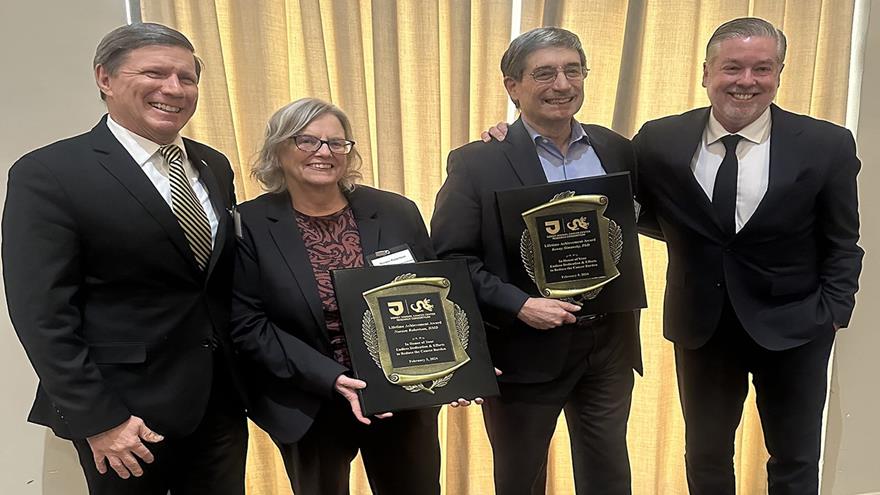Westphal College Receives Drexel’s Largest-Ever NEH Grant, Will Host First Summer Institute on the History of Design

- Bolstered by Research Consortium with Drexel, Jefferson’s Sidney Kimmel Cancer Center Earns NCI Comprehensive Cancer Center Designation
- No link between acetaminophen use during pregnancy and children's autism risk
- Ribbon-Cutting Ceremony Marks Official Unveiling of Drexel Station at 30th Street
- Drexel Recognizes Gregory E. Deavens, CPA, CGMA as Business Leader of the Year

Among college students, interest in the field of applied design — from graphic design to fashion design to interior design — is growing rapidly. In fact, the number of students completing degrees in design has doubled over the past 20 years, according to the annual Higher Education Arts Data Services survey. But, while art history courses have been a staple at many colleges and universities for years, courses in the history of design are few and far between.
Now, a new summer institute at Drexel University will address this lack by offering an intensive learning experience in the history of design in order to prepare educators to explore and teach the subject. The four-week institute, funded by a grant for approximately $200,000 from the National Endowment for the Humanities (NEH) — the largest grant Drexel has ever received from the NEH — will be held at Drexel’s Antoinette Westphal College of Media Arts & Design from July 6-31.
“We’re thrilled to be the recipient of the largest NEH grant in Drexel’s history and to have the opportunity to host Drexel’s very first NEH Summer Institute,” said Allen Sabinson, dean of the Westphal College. “While design history has found a strong footing in the Westphal College, we’re excited to be able to deepen that engagement and expand the humanities footprint of the university by exploring the subject and sharing ideas with leading scholars from across the country.”
Entitled “Teaching the History of Modern Design: The Canon and Beyond,” the institute is designed to explore a combination of traditional and alternative approaches to the study of design history, and to help college faculty from diverse disciplinary backgrounds to offer engaging courses in the field. Twenty-five college faculty members from across the country will receive a stipend on order to have the opportunity to share and to learn about the study of designed objects that shape peoples’ everyday lives
“The world of things, manufactured and designed, is of great interest to makers and commentators alike,” said Jeremy Aynsley, PhD, a professor of design history at the University of Brighton, who served as a visiting scholar in residence at the Westphal College in August 2011. “To introduce the skills to teach and interpret those cultural products in ways that enlighten students engaged in the serious study of art and design will be of important significance for shaping our future.”

The institute is being directed by David Raizman, PhD, distinguished university professor in the Department of Art & Art History in the Westphal College and author of a key introductory text in the field, “History of Modern Design” (2nd edition, 2010), who applied for the grant.
“I’ve been thinking about and talking with colleagues about the need for an institute that brings people together to share information and strategies for teaching the history of design since 2007,” said Raizman. “Now thanks to the NEH, we’re able to conduct such an institute here at Drexel, focusing upon how we all can create and deliver stimulating courses in an exciting field, challenge assumptions and explore new territory and approaches to the subject for our students.”
During the month-long program, six internationally known visiting scholars, along with Raizman, will lead in-depth seminars on a variety of topics, including the mass market for designed goods, the role of gender in design and design in a global context. Each unit will cover a broad range of significant designers, manufacturers and geographical regions, and will reveal the roles played by technology, politics and social relations in the historical study of design.
The visiting scholars include ReginaLee Blaszczyk, PhD, Leeds University, England; Maria Elena Buszek, PhD, University of Colorado Denver; Catharine Rossi, PhD, Kingston University, England; Sarah Teasley, PhD, Royal College of Art, London; and Vladimir Kulic, PhD, Florida Atlantic University. Carma R. Gorman, PhD, University of Texas at Austin, will serve as project faculty.
Field trips to regional museums and collections such as Drexel’s own Fox Historic Costume Collection, the Philadelphia Museum of Art, the Hagley Museum and Library in Delaware and the Museum of the Fashion Institute of Technology in New York will provide participants with experiential learning opportunities and suggest ways to use local collections in their own teaching.
Group presentations by participants will take place during the final week of the institute. The participants, in teams of three, will conduct collaborative research on specific topics in modern design history. Teams will meet regularly with the director, visiting scholars and project faculty for feedback and suggestions. Presentations will include a suggested bibliography, videography, lecture/discussion outline and suggested activity or field trip.
The application deadline to attend is March 2. For more information and to apply, visit http://drexel.edu/westphal/historyofmoderndesign/.
Each year, the NEH offers tuition-free opportunities for college and university educators to study a variety of humanities topics. The NEH Summer Seminars and Institutes are intended to extend and deepen knowledge and understanding of the humanities by focusing on significant topics and texts; contribute to the intellectual vitality and professional development of participants; build communities of inquiry and provide models of civility and excellent scholarship and teaching; and link teaching and research in the humanities. These programs are designed for a national audience of teachers.
David Raizman, PhD received his doctorate in art history at the University of Pittsburgh in 1980 and came to Drexel in 1989. He is the author of “History of Modern Design”, (Laurence King and Pearson Publishing, expanded second edition in 2010), based on more than 30 years of active teaching and scholarship in art and design history. The book is currently used as a text at more than 100 colleges and universities worldwide. Raizman serves on the editorial board of Design and Culture, a peer-reviewed journal which focuses on history, theory and criticism of contemporary design. He also is a member of the Design Studies Forum (DSF), which was founded in 1983 and seeks to build the study of design history in the United States.
Carma R. Gorman, PhD, will serve as a visiting scholar and project faculty for the institute, contributing a seminar on her recent research on the subject of design and the law. She is an associate professor in the design division of the Department of Art and Art History at the University of Texas at Austin. She writes about design in the "long" 20th century—from Frank Lloyd Wright's costume designs to recent "faith-based" electronics—and has published reviews and articles in American Quarterly, Design and Culture, Design Issues, Journal of Design History, Studies in the Decorative Arts and Winterthur Portfolio.
Regina Blaszczyk, PhD, serves as leadership chair in the History of Business and Society at the University of Leeds in the United Kingdom, and associate editor at the Journal of Design History. She is the author or editor of seven books, including Imagining Consumers: Design and Innovation from Wedgwood to Corning (2000), which won the Hagley Prize for the Best Book in Business History for 2001, Producing Fashion: Commerce, Culture, and Consumers (2008), American Consumer Society, 1865-2005: From Hearth to HDTV (2009) and The Color Revolution (2012), which won the 2013 Sally Hacker Prize from the Society of the History of Technology. Her background includes positions as cultural history curator at the Smithsonian Institution, an American studies professor at Boston University and a senior manager at the Chemical Heritage Foundation.
Maria Elena Buszek, PhD, is a critic, curator and associate professor of art history at the University of Colorado, Denver, where she teaches courses on modern and contemporary art and design history. Her recent publications include the books Pin-Up Grrrls: Feminism, Sexuality, Popular Culture (Duke University Press, 2006) and Extra/Ordinary: Craft and Contemporary Art (Duke, 2011). She has also recently contributed essays for the exhibition catalogue In Wonderland: The Surrealist Adventures of Women Artists in Mexico and the United States, and scholarly journals such as Art Journal, TDR: The Journal of Performance Studies and American Quarterly. Her current book project explores the ties between contemporary activist art and popular music.
Catharine Rossi, PhD, is a senior lecturer in design history at Kingston University in London. She has also taught at Edinburgh College of Art and the University of Brighton and is currently a visiting lecturer at Sotheby's Institute of Art. Her publications include Crafting Design in Italy: From Postwar to Postmodernism (Manchester: MUP, forthcoming), The Italian Avant-Garde 1868-1976, co-edited with Alex Coles (Berlin, Sternberg Press, 2013), a catalogue essay for the Postmodernism: Style & Subversion 1970 – 1990 exhibition at London’s V&A Museum, articles for the Journal of Design History, Design and Culture, The Journal of Modern Craft and international magazines such as Disegno and Domus. She also writes the blog thinkingaboutobjects. Her areas of expertise include post-war Italian design and political and socially-engaged approaches to design and its historiography.
Sarah Teasley, PhD, is a reader in design history and theory at the Royal College of Art in London. Her research uses case studies from the history of product and furniture design and manufacturing to consider broader issues in design, society and technology today. Her publications include Global Design History (Routledge, 2011), 20th Century Design History (Petit Grand Publishing, 2005) and Designing Modern Japan (Reaktion, forthcoming) as well as numerous book chapters and journal articles. Her current research explores the impact of industrial policy on everyday experience through the lens of the furniture industry in Japan, c. 1890-1960. She is associate editor of the journal Design and Culture and former vice-president of the Design Studies forum.
Vladimir Kulić, PhD, is a design historian and assistant professor of architecture at Florida Atlantic University in Boca Raton and Fort Lauderdale. He specializes in architecture after World War II, modernism in Central and Eastern Europe, the global exchanges of architectural culture and contemporary criticism. He is the author of Modernism In-Between: The Mediatory Architectures of Socialist Yugoslavia (with Maroje MrduljaÅ¡ and Wolfgang Thaler, 2012) and of numerous articles on architecture in the former Yugoslavia. He is also the editor of Unfinished Modernisations: Between Utopia and Pragmatism (with Maroje MrduljaÅ¡, 2012) and of Sanctioning Modernism: Architecture and the Making of Postwar Identities (with Monica Penick and Timothy Parker, forthcoming 2013).
About the National Endowment for the Humanities
Created in 1965 as an independent federal agency, the National Endowment for the Humanities supports research and learning in history, literature, philosophy, and other areas of the humanities by funding selected, peer-reviewed proposals from around the nation. Additional information about the National Endowment for the Humanities and its grant programs is available at: www.neh.gov.
Drexel News is produced by
University Marketing and Communications.